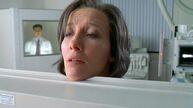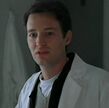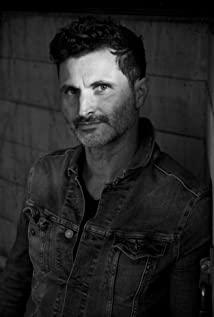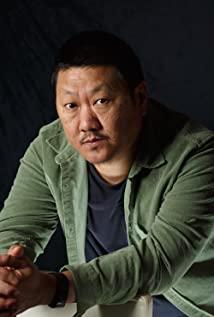The film mainly describes a series of hospitalizations of Miss Benin due to terminal cancer, interspersed with her inner monologue, recalling the past, in the cold hospital, in the empty ward where she was the only one, her illness after her illness Feelings and how the medical staff in the hospital faced her as a special "experimental subject".
The first sentence at the beginning of the film is what Miss Benin’s attending doctor said: "you have cancer" is a very straightforward and concise sentence, without any extraneous expressions. Immediately afterwards, he gave a detailed description of the cancer, using relatively professional terms. At this time, Miss Benin was also expressionless. After a brief pause, she only said two words: "go on". For someone else, after hearing that they have cancer, they may show more or less panic, restlessness, and sadness. However, in the eyes of Miss Benin, these psychological activities cannot be captured in her expression. In the introduction, you can gradually understand that this may be caused by Miss Benin, who is also rational and calm as a scholar, and her own personality factors. The first communication between doctors and patients was based on conversations between intellectuals, so the conversation seemed smooth and equal. Faced with relatively professional terminology, Miss Benin showed that she could understand, and even used her literary expertise to correct Dr. Colin’s wording; in the face of her illness, she also behaved quite strong and believed that she was confident and capable. overcome. However, things were not as smooth as she had imagined, or she actually regretted not asking the doctor about her treatment in more detail.
After admission, the attitude of the medical staff first made her feel sad and helpless. Faced with her madness, some people will ask "how are you feeling today" as a routine. I think that at this time, the patient needs more comfort and a glass of warm water, without any words, because in fact, we can't empathize with each other. What can we do if we ask "how do you feel?" No matter if the patient says "I am fine" or "I am not good", what can we do? The treatment cannot be terminated, the side effects of the drug cannot be stopped, and uncomfortable feelings will continue to appear. What we need to do is more comfort with body language, even if it is just a light pat on her She felt that she was not alone.
Then, Miss Benin was pushed for CT and endoscopy.
After being pushed to the CT room, her wheelchair was evacuated. The nurse kindly wanted to find another wheelchair for her, but she said that she could walk there without having to do so much trouble. In fact, we cannot push all the errors to the medical staff. As a patient, Miss Benin also did not show absolute trust in the medical staff. Because she always felt that she was a scholar with a little reputation, wise, thoughtful, respected, and arrogant. Maybe the medical staff will ignore her achievements as a scholar, but she also forgets that she is just a patient here. She does not ask about her condition or understand her condition, and even makes actions that are not in line with her physical status. When doing endoscopy, the assistant doctor was a former student of Miss Benin. Miss Benin started to be a little happy because she thought someone could talk to her about topics that she was interested and good at. However, this student was just I took a simple sentence or two, and even showed that I was depressed because this course did not reach Grade A. I understand for the time being that his time is limited, and he cannot waste time on issues that are not particularly important. When we asked about the medical history, we learned about Miss Benin’s personal history: unmarried, not having sex, and having passed menopause. This is a foreshadowing for the next endoscopy.
The male doctor treated the unmarried lady who had not had sex as mechanically as a model doll: raised the bed, put on the sheets, pulled out two pedals from the lower part of the bed, took off the shoes and threw them quickly. On one side, he put his feet on the rigid frame, and dragged the patient down to bring his body closer to the lower part of the bed. After doing this series of actions, he forgot to call a female colleague, so he left the patient aside. Although, I can understand that this doctor did not mean it, because Miss Benin did not give him a "A" in the elective course of English poetry in the seventeenth century and was very rude to Miss Benin. He may have a lot on hand. Other things to do, may need to hurry up. But I can be sure that he did not treat this patient as a person. He only paid attention to the disease, not the individual who was sick. From beginning to end, Miss Benin hugged her hands tightly in front of her chest, showing that her heart was very disturbed, and she was obviously insecure in such an environment. Because she has not had sex, she is wary of this male doctor, and feels terrified and embarrassed by his rude methods. The doctor was completely unaware that he even mentioned in front of other doctors that he had been a student of Miss Benin, and showed that he was extremely disinterested in this course. When talking about this, Miss Benin was already because The pain of the endoscopy, the tears were rolling in the eye sockets, but the doctor was completely unaware of it. Seeing this, I think Miss Benin is already quite dissatisfied with this male doctor, and may even think that this is what the hospital looks like. Fortunately, there is also a compassionate head nurse here. She slowly helped Miss Benin up and handed her a tissue. Although it is only a small act, it may make the patient feel a little comfort in his heart, at least it is being noticed by others, and at least one's own pain is known to others. It was the head nurse. After realizing that no one had come to visit Miss Benin, he paid more attention to her. After vomiting, she asked if she would like to eat some fruit, patted her and told her if she had something to do, go and call her. I think what the patient needs is a kind of spiritual support. Words like "call me if you have anything" and "I'm always by your side" are a kind of strong support for patients, which can make patients feel that they are not alone and helpless. Doctors and nurses stand together with themselves and suffer from illness. Those who resist will give the patient a strong psychological suggestion that they are powerful and able to sustain it.
After that, it switched to the scene of the attending doctor and assistant doctor, and this time there were other doctors participating in the experiment.
Everyone is very engaged in this scientific research. It is clear that what is in front of them is not a person, but an experimental mouse. It was still the male doctor, who quickly lifted the bed sheet covering Miss Benin's belly, and then began to press and point on it. The next boss kept asking questions about the medication and body reaction. No one asked how she felt. After a series of pomp, the mighty team just left. When I saw this, I remembered what we did when we were on the apprenticeship. In fact, we also go to the ward for consultations with a learning mentality. Sometimes we ignore the feelings of patients. Sometimes patients may be really bored and want to talk to us, but every time they have to talk endlessly At that time, we also had to interrupt them. Maybe this kind of thing is inevitable, but can we have some remedies? For example, talk about topics that the patient is interested in appropriately, listen more as time allows, and don't interrupt them in a blunt way, but tactfully? Or comfort him and listen to him for a while, use concise words to tell the family, let the family convey their concern about the patient and expectation for the recovery of the disease, etc. Is this also a kind of communication that can make the patient understand us more? Then there was Miss Benin’s inner monologue, echoing the opening, she still did not ask the doctor about the treatment of her disease. What was different from before was that this time, she wanted to know what the doctors were talking about, and she wanted to understand. She was no longer pretending to be able to understand what the doctors were saying. However, she still did not ask. I think it may be because she thinks that no one has time to listen to her questions, and no one has the patience to explain to her. Just imagine, when you face a cold, hurried face, what desire do you want to tell him how you feel? What courage do you have to ask?
Later, Miss Benin came to the hospital again because of a fever and chills. Her attending doctor came over and took a look with sleepy eyes. After saying something, she left without any major problems, without even going to her to take a closer look at her. Faced with such a situation, she still did not reduce the dose, ignored her pain, just focused on her own research. The indifference of the attending doctor will not be mentioned for the time being. There is one more detail. When the head nurse proposed to reduce the dose for her, the male doctor disagreed and thought she could bear it. She was very strong. I think what makes this doctor think so? Maybe it was Miss Benin herself. From the very beginning, Miss Benin showed a gesture of rejecting people thousands of miles away, whether it was when the attending doctor wanted to explain her condition or when the head nurse wanted to help her, she always behaved. Is too cold. Maybe it’s the high-ranking intellectuals who are at the trouble. Miss Benin doesn’t trust the medical staff enough. She knows that she is not feeling well, but she still insists on it, whether she is dedicated to science or can recover for herself. She and the attending doctor or There is almost no communication with the head nurse. In fact, if the attending doctor is unwilling to listen and has no time to listen, he can also tell the head nurse how he feels and thinks. Sometimes it’s okay to rely on others a little bit. Without communication, others don’t know how to help.
After undergoing a B-ultrasound examination, Miss Benin finally made some changes, but she was disappointed in the result. She started asking questions about her condition, and the attending doctor tried to answer her questions in a language she could understand. Doctor-patient communication, the doctor's side is destined to work harder, because the patient doesn't understand anything. People often feel fear because they don’t understand something. What we need to do is to find a way to let patients understand what we know, and only when patients understand can we better cooperate with doctors. This was a good communication at first, but the problem came again: when Miss Benin asked him why he chose the oncology department, the doctor answered as if the teacher was telling a student about his own research. Yes, the feelings for cancer cells are as fascinating as the lovers, full of admiration. He didn't even consider that what he was facing was a cancer patient, a patient who was tortured by the "unbelievable" things in his eyes. Therefore, in addition to letting the patient understand the condition, we must also pay attention to the patient's feelings. Do you notice other people's feelings when you talk about things you are interested in? What should be more appropriate in this situation? I think the detailed description is very good, but it must be returned to the patient in the end. For example, this cancer cell is indeed very powerful, but we are now using a very powerful drug for you, although it may bring you A lot of discomfort, but it is helping you eliminate the powerful cancer cells. Encourage the patient, give the patient strength, and let the patient have the confidence to overcome the disease.
After that, Miss Benin finally couldn't sustain her mentally, and it was the first time she asked others for help. The head nurse has been comforting her since coming in, affirming her with her eyes and words. I said "I know I know" while filming her. She understands her pain, understands her persistence, and affirms and encourages her resistance. Here, the head nurse kindly called her Vivienne, and her doctor always just called her Professor Benin. The head nurse successfully closed her relationship with her, and Miss Benin finally couldn't restrain her sadness. For the first time, she cried in front of others, expressing her helplessness and fear. The two were eating popsicles in the ward, and Miss Benin finally no longer frowned, and finally calmed down. After the conversation, Miss Benin asked the head nurse if she would continue to take care of her. The head nurse said "of course sweet heart" with a very positive expression. Immediately afterwards, Miss Benin's condition didn't seem to be very good. She had completely collapsed from body to mind. She could no longer restrain her pain and groaned. Her attending doctor also had a solemn expression and seemed very sad, and he wanted to say something but left without saying anything. Except for the routine "how are you feeling today", he can no longer find other words to communicate with patients, which is a big irony. Although looking at the patient so painful and saying everything, I look pale and weak, but you can look at her with sympathetic eyes, squat down to touch her, hug her, and tell her that if you want a good night’s sleep, you can give her a morphine. This kind of words, at least said and done these can give her a little comfort. On the other hand, the head nurse, when Miss Benin asked whether the effect of this morphine would make her eyelids heavy, her answer could make her laugh. This was the only laugh from the whole film, because in this, Miss Benin has re-realized the feeling of being a teacher. As a patient, she is not a waste. At least she used her professional knowledge to explain the meaning of words to others.
The film is now nearing its end, after which Miss Benin fell into a coma and her heart stopped beating. However, her attending doctor ignored her as a DNR patient and insisted on rescue. Fortunately, she was eventually stopped by the head nurse. Miss Benin finally died as a person with dignity.
Finally, I would like to quote a sentence from the seventeenth-century British poet John Dunn that Miss Benin has been studying throughout the play as a concluding remark: No one is a self-contained and isolated island. Individuals are part of the vast continent. If the waves wash away a rock, the land will be smaller. It's like losing a corner of a cape, like losing a piece of your friend or your own territory. Everyone's death is my sorrow, because I am a member of humanity as a whole. So, don’t ask for whom the death knell sounds, it sounds for you!
The above is the homework of a serious medical student's doctor-patient communication class...
View more about Wit reviews











